Addressing Global Challenges Locally: Jordanian Women and Youth as Champions of Climate Action and Empowerment
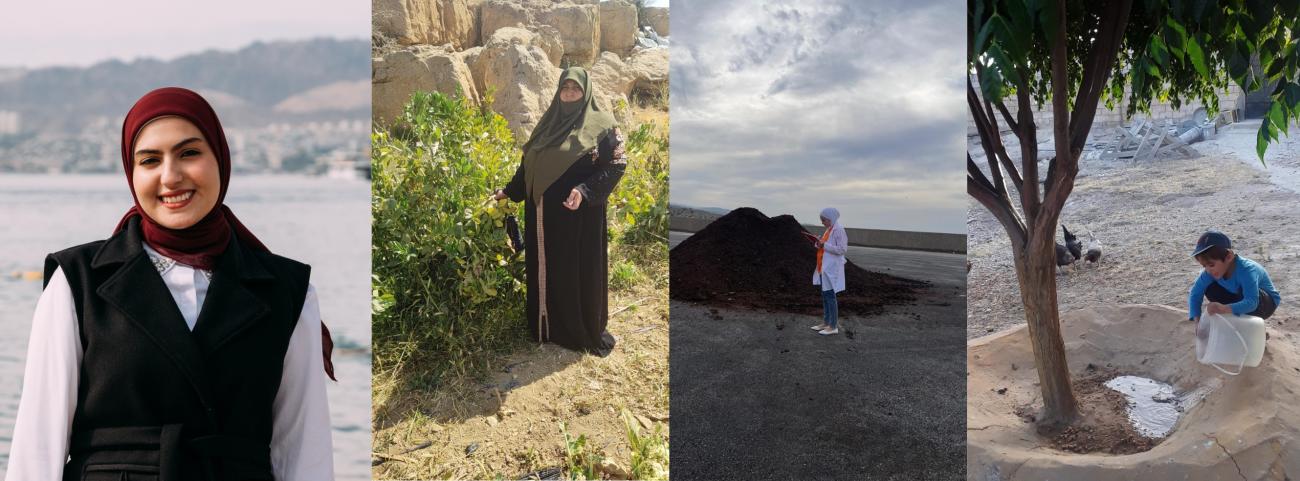
In the face of mounting global challenges, Jordan's youth and women are turning adversity into opportunities for change and progress.
As climate change impacts
Mariam, a teacher who inspires environmental action among her students
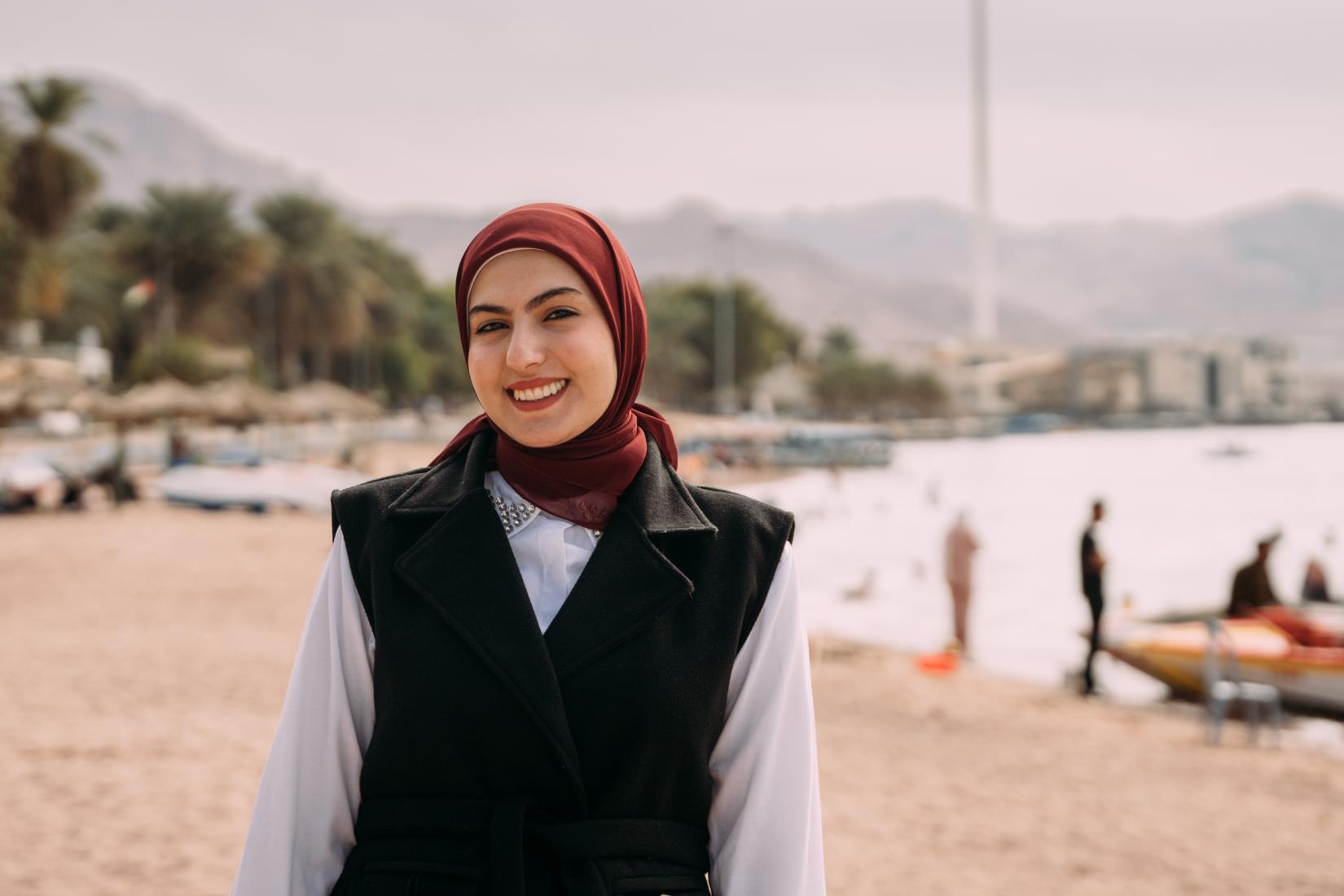
Mariam, a 22-year-old psychology major and teacher in Aqaba, Jordan’s only coastal city, has always been passionate about environmental issues. “My dad would take our family to the beach for picnics, but I was horrified that people didn’t pick up their trash,” she says. This early interest grew when, at 15, UNICEF staff visited her school to teach about the environment. “I learned that there is a lot we can do to take climate action,” she recalls.
At 21, Mariam joined the UNICEF-supported ‘Sawn’ program, meeting other young people committed to environmental activism. “It makes me proud to see how smart and aware Jordanian youth are about this issue,” she says.
UNICEF launched the Sawn program in 2022 to empower young climate leaders with the training and skills needed to design and lead climate action locally and globally. These leaders train additional youths, roll out advocacy initiatives in all 12 governorates, and participate in international discussions on youth climate activism.
“I educate my students about the environment,” Mariam explains. “I can see the pride in their eyes when they take action to clean up the environment. My hope is that they grow up holding onto those values so they can play their part in saving the planet.”
Mariam’s journey reflects a broader movement of young Jordanians committed to a sustainable future. “The most important thing for our world is to save the planet,” she concludes. “The climate is changing faster than we are responding, and the only way to fight this is to accelerate the greening of our world.”
Dina champions environmental and economic progress in the north of Jordan
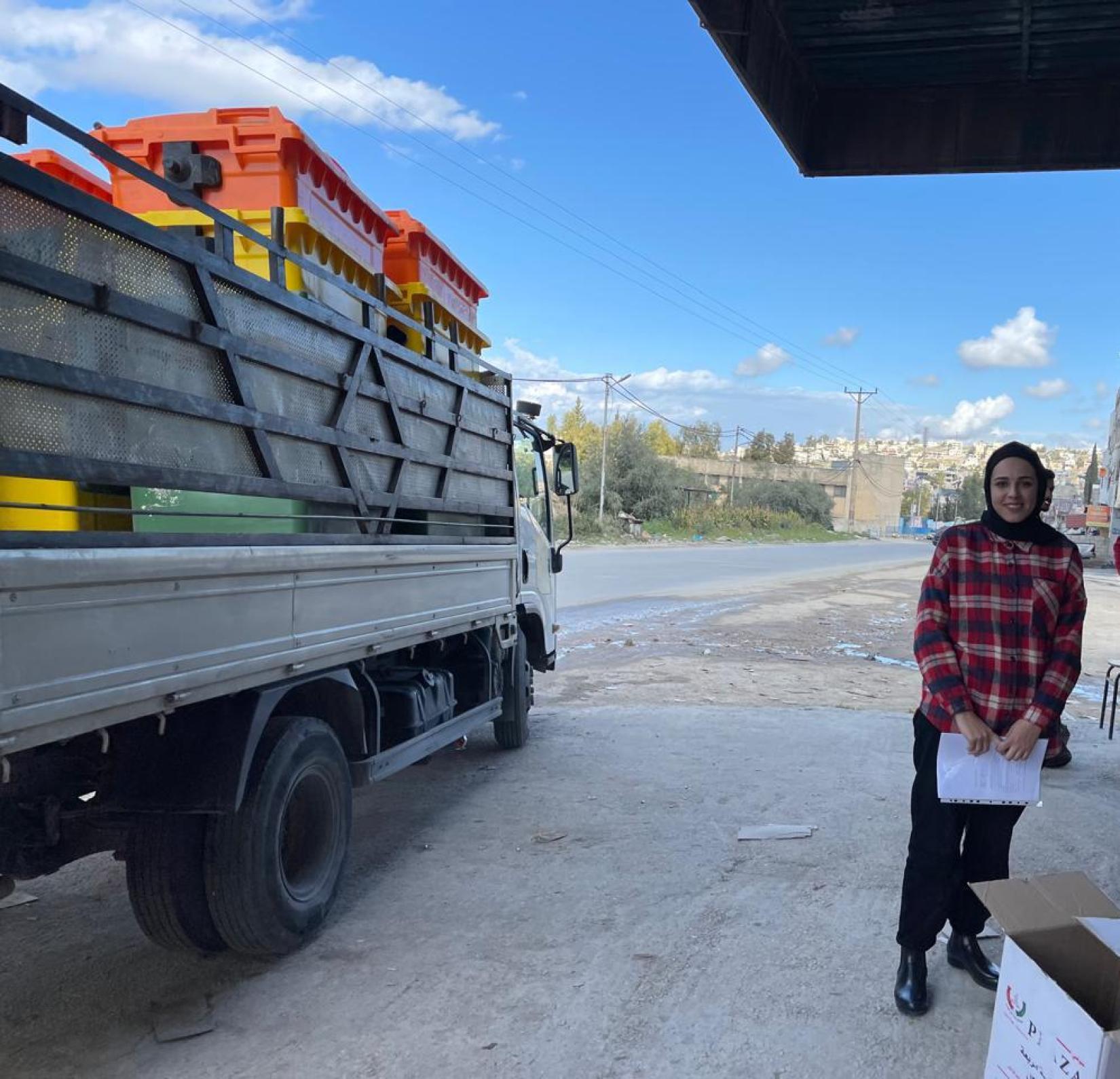
Dina Rashdan leads significant environmental initiatives in Jordan through a UNDP-supported project focused on organic fertilizer production and recycling. © UNDP Jordan
At the age of 32, Dina Rashdan is leading significant initiatives in Jordan through a UNDP-supported project focused on organic fertilizer production and recycling. “Leading this project has allowed me to make a real difference in environmental preservation and waste reduction,” Dina explains. “It gives me a sense of contributing to positive social and environmental responsibility.”
The project significantly impacts the environment by reducing the amount of solid waste buried in landfills, thereby decreasing pollution and its negative effects. The production of organic fertilizer not only improves soil fertility but also helps recycle organic materials, lowering greenhouse gas emissions from decomposing waste. This initiative plays a crucial role in preserving natural resources and reducing their depletion.
Economically, the project has created numerous job opportunities in fertilizer production and recycling operations. It has also decreased waste management costs for local authorities while providing affordable, high-quality organic fertilizer for local farmers. Developing a new value chain for recycling and utilizing recycled materials has significantly boosted the local economy.
“Offering jobs in various areas such as collection, sorting, and marketing has allowed us to improve living standards,” Dina shares. “Participants have acquired new skills in operations, maintenance, and management, enhancing their job prospects.”
The UNDP-supported project employs 24 women and 8 young people, all of whom have received comprehensive training to ensure their competence. The organizational structure includes several departments: administrative, laboratory, marketing and distribution, machinery operators and maintenance, collection and sorting, and packaging.
UNDP’s Enhancing Women’s Participation in the Solid Waste Management Sector Project in Northern Jordan serves as a model for promoting women's empowerment and gender equality. This project has created economic opportunities for communities, especially women, across several governorates. Benefiting 660 women in northern Jordan, it has also initiated new development stages, including the Biodiversity Enhancement in Aqaba project and the Mitigating Climate Change through Solid Waste Management in Southern Jordan project. These initiatives introduce innovative upcycling activities to bolster the green and renewable energy sector.
The project’s impact includes strengthening the role of women community-based organizations (CBOs), providing financial support to CBOs and cooperatives led by women, and collaborating with national and local governments to enhance gender-responsive policymaking. The construction of a composting plant and sorting station in Al Koura further supports these efforts.
“The climate is changing faster than we are responding, and we must act quickly to accelerate the greening of our world,” Dina concludes.
Through water harvesting, Mariam preserves water and secures income
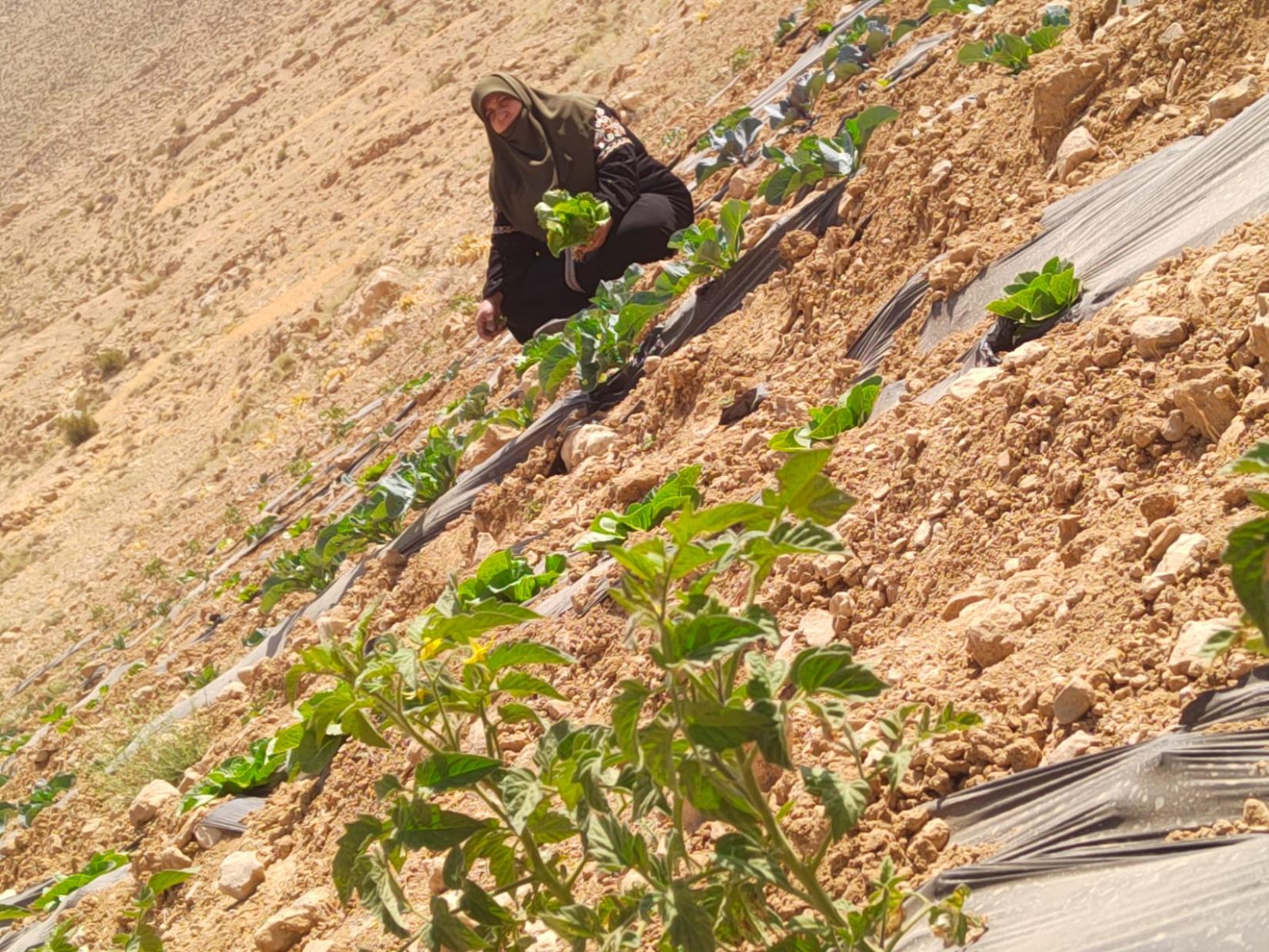
Mariam, a Syrian refugee in Jordan, crafted a plan to build a rainwater harvesting system and cultivate a variety of vegetables on a 2,000-square-meter plot. © FAO Jordan
Mariam Al-Joumaa, a 57-year-old Syrian refugee, faced many hardships after fleeing the conflict and living in Jordan. Her only income came from humanitarian assistance from the UN in Jordan. However, Mariam’s unyielding spirit led her to a new opportunity through FAO’s grant program " Transformation to more efficient, inclusive, resilient, and sustainable agrifood systems”, funded by the Norwegian government.
Partnering with Mohammad, a Jordanian landowner, Mariam crafted a plan to build a rainwater harvesting system and cultivate a variety of vegetables on a 2,000-square-meter plot. “The application process was intimidating, but I persevered,” Mariam says. The grant transformed the land, and soon, onions, beans, and cauliflower were flourishing.
After just three months, Mariam was harvesting not just for her family but for sale, securing profits. “This project reduced the burden on my shoulders,” she shares.
Mariam and Mohammad plan to expand their project, inspiring others to find their own path to self-sufficiency. “In Jordan, I have cultivated a future filled with possibilities,” Mariam concludes.
Through this project, FAO is empowering hundreds of vulnerable Jordanians and Syrian refugees by building rainwater harvesting systems. Where women, refugees, and Jordanians alike, are being equipped with the knowledge and resources to thrive. FAO's capacity-building programs equip them with the skills for sustainable agriculture and food systems. Furthermore, micro-financing and market access open doors to financial independence, while job creation programs connect beneficiaries with work opportunities.
Targeting 300 individuals, the project prioritizes empowering youth, ensuring their long-term income and nutritional well-being. With over 300 jobs already created, this initiative is not just building systems; it's building a brighter future.
Seeds of Change: Razan and her family’s journey to permaculture and sustainable living
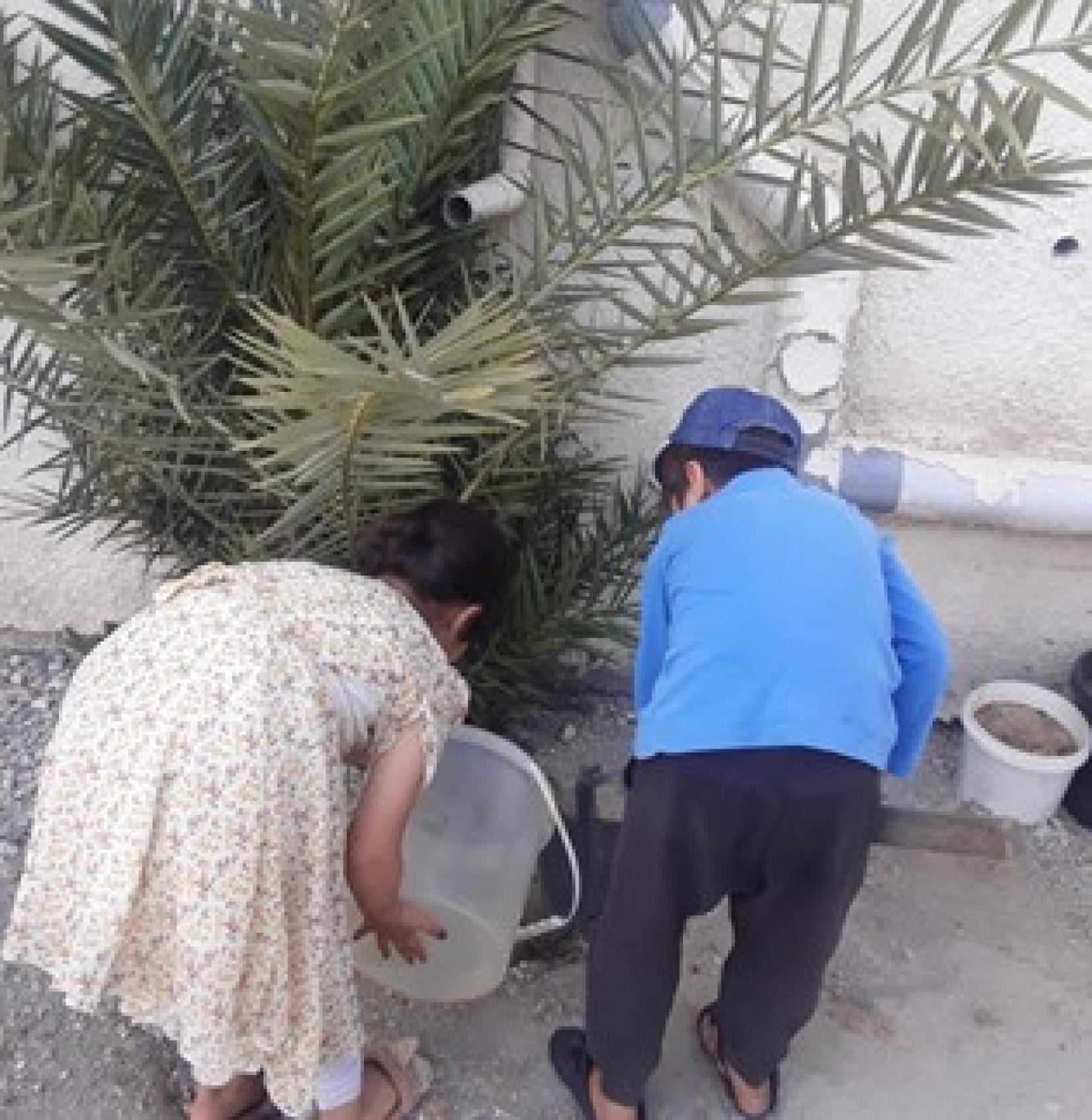
Razan’s young children water the trees in their home garden, Jerash, Jordan, 26 May 2024. © UN Habitat Photo
In Jerash, 48 kilometers north of Jordan’s capital, Amman, 40-year-old Syrian refugee Razan Awad embarked on transforming her small home garden into a thriving food source. As part of the "Resilient Water Solutions Against Climate Change in Jordan and Lebanon" project by UN-Habitat, Razan received training tailored to refugees and local communities, empowering her with essential permaculture skills.
Facing Jordan’s water scarcity, which is worsened by climate change, Razan's journey underscores the importance of permaculture in providing food security and economic resilience. Through intensive sessions, participants like Razan learn efficient water management, crop selection, and pest control, supported by methodologies from the Permaculture Research Institute.
With newfound agricultural skills, Razan not only improves her family's diet but also generates a modest income, easing her economic burdens. She eagerly awaits part two of the training to apply the new techniques fully. "Agriculture has helped me immensely," she says. "I cultivate essential crops in my small home garden, and this has significantly improved our well-being. I can't wait to see the bigger impact after applying everything we learned in my garden with the trainers and the team."
Passing on her knowledge to her children, Razan fosters a passion for agriculture. As they learn about trees, she planted one, enhancing comfort and family bonding. Looking ahead, Razan dreams of a larger garden and sustainable living.
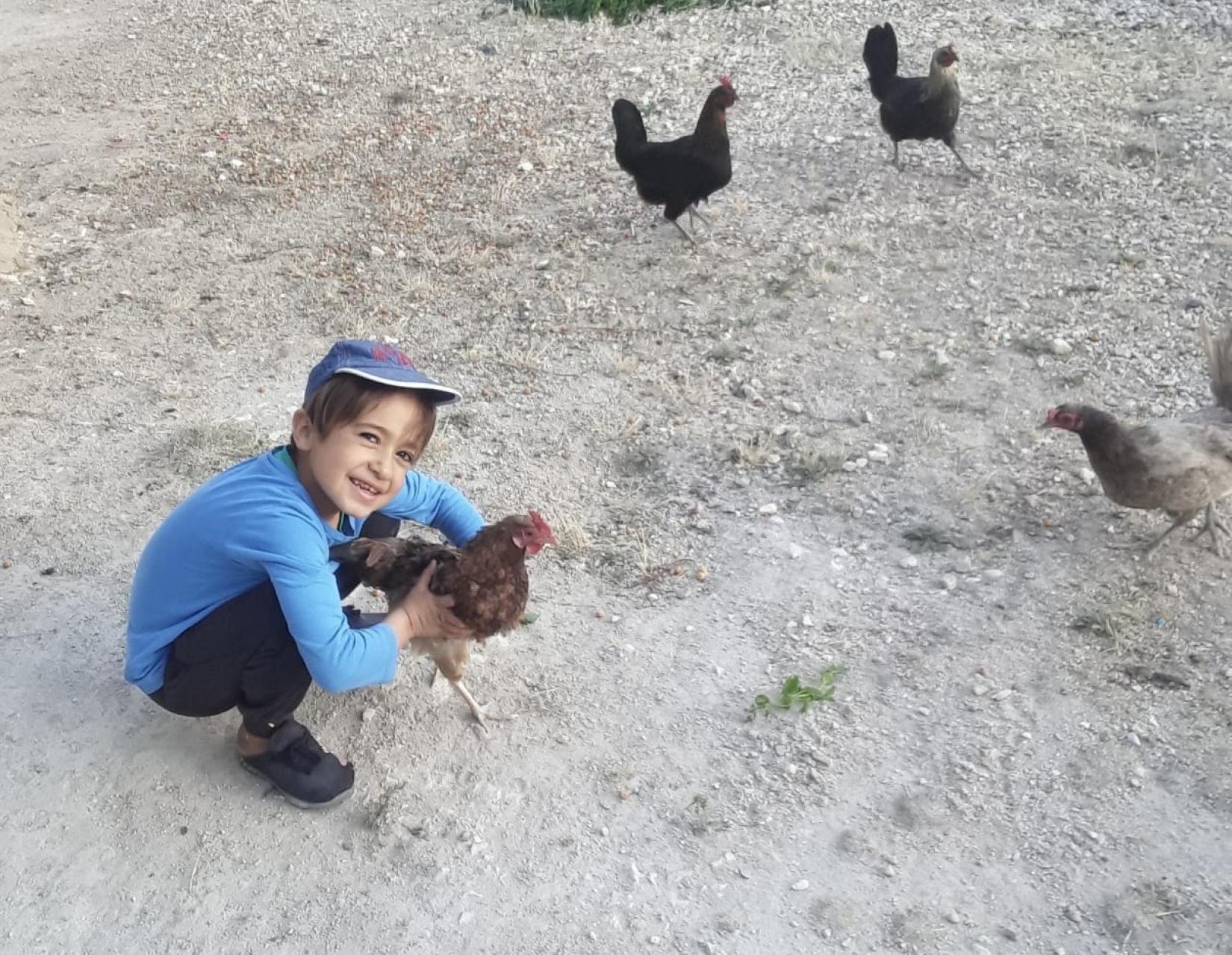
© UN Habitat Photo
*This story is a compilation of narratives contributed by UNICEF, UNDP, FAO & UN Habitat.



